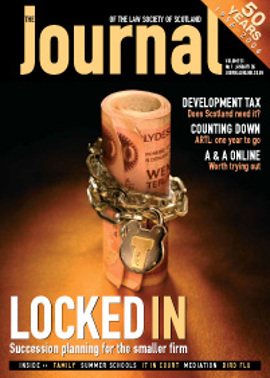If the bug bites

Expert opinion worldwide states that it is not a matter of if, but when an avian (or bird) flu pandemic will strike. Whether it happens or not, it is good business practice to be prepared for unforeseen problems. This article gives some suggestions for steps a legal firm can take to mitigate the risk.
The most important point to recognise is that this pandemic will hit at the most valuable resource of any organisation – its people. Computers won’t catch this virus!
What is avian flu?
Avian flu, or H5N1, is a strain which has proven to be considerably more deadly than previous strains of flu. Although to date the only way of catching H5N1 is directly from diseased birds, it is able to mutate rapidly and may become contagious through human to human contact. When this happens it will be the start of the pandemic.
Out of the first 109 reported cases, all in south east Asia, there were some 60 deaths. It is this very high mortality rate which is causing concern across the world.
Until the precise mutation of the virus is identified it is not possible to develop drugs which will provide immunity. UK stockpiles of the only drug (Tamiflu) which is expected to slow down and reduce the severity of the flu are not sufficient to inoculate everyone. The Cabinet Office committee COBRA will prescribe who should be inoculated, with those in what are deemed to be essential jobs first.
What will be the impact?
No-one knows exactly what the impact will be. The World Health Organisation (WHO) estimates that a pandemic could easily reach the scale of the Spanish flu pandemic in 1918-19, which killed between 20 and 30 million people. We now have considerably more and faster international travel than at that time.
The COBRA committee has given direct instructions to the NHS across the UK to prepare for a pandemic. Accordingly, the NHS is reviewing its continuity and emergency plans, considering scenarios like how it will be able to operate with 30% of staff absent due to the flu. It is only by taking this risk seriously now, that businesses will be able to prepare for it.
Essentially all businesses will be impacted by a pandemic. Government restrictions may limit public gatherings, even for example at court appearances. Travel restrictions are highly likely to be imposed. (The Australian Government plans in effect to seal off the country, closing air and sea ports.) As public confidence is hit, all entertainment venues will suffer.
The impact of loss of staff will be felt across all sectors. Deliveries to and from businesses will be hit. Stockpiling foodstuffs could occur at the same time as transport restrictions make replenishing supermarket shelves problematic. Online shopping is liable to grow as individuals retreat to the safety of their homes. Law firms will not be immune to the wider impacts. This problem hits at people, not systems or infrastructure.
What can we do now?
When a pandemic occurs there is certain to be a large number of deaths. This may change markedly the nature of work for legal firms. There may also be a surge in will-making in the weeks after a pandemic is announced.
A simple 10 point checklist of actions which can be carried out now, will ensure that any firm is as prepared as it can be.
1. Review all existing continuity and contingency plans, particularly those based on scenarios where staff are affected. (If you don’t have business continuity plans, create them now.)
2. Test the plans. Simply having a document does not mean it will work.
3. Reduce your reliance on people by ensuring you have all your business processes documented.
4. Put the names of all staff in a hat and draw out 25% at random. Then consider how the firm will operate if those people are not available for a period of time. Cross-train staff to ensure essential processes can continue.
5. Consider how your business could provide remote access to essential resources. Technology can give access to systems, but access to paper files will be harder. It may be worth considering creating a rota of staff to act as couriers to those working from home.
6. Get in touch with your local authority to ask what their contingency plans involve at a higher level. They may be able to give advice.
7. On the assumption that staff will be restricted in their movements, carry out a review of remote-access technologies (which may need to include security policies) and homeworking policies.
8. Review staff travel and health policies.
9. Review the readiness of any key suppliers to your business. How robust will your supply chain be?
10. Continue to watch the media and the WHO websites for further information.
Is this just another Y2K?
In the run-up to the year 2000 the experts were unanimous in agreeing that there was a risk to software and systems if steps were not taken. Businesses responded and more than £10 billion was spent globally on preparations. Maybe Y2K was a phantom menace, but equally valid is the view that it was only through these efforts that there was little impact. Experts from the WHO (and others) are telling us that we are at risk from a flu pandemic. Can we afford to ignore them?
Andrew Sinclair is Commercial Director of Glen Abbot Ltd, business continuity services consultants.
In this issue
- Pressing ahead
- Regulation, 2006 style
- Held to ransom?
- A world turned upside down
- Quiet revolutions
- For supplement read tax
- Why mediation is a bad idea, and other myths
- Advice in a Europe of many notions
- At the touch of a button
- What sort of courts do we want? (And when?)
- KM in practice
- If the bug bites
- Refreshing risk quiz
- The partnership must go on
- First duty to the court
- A difficult birth
- Nuclear power no thanks?
- Due diligence
- Will less mean better?
- Scottish Solicitors' Discipline Tribunal
- Website reviews
- Book reviews
- Back to the future
- Users' IT requirements for ARTL






